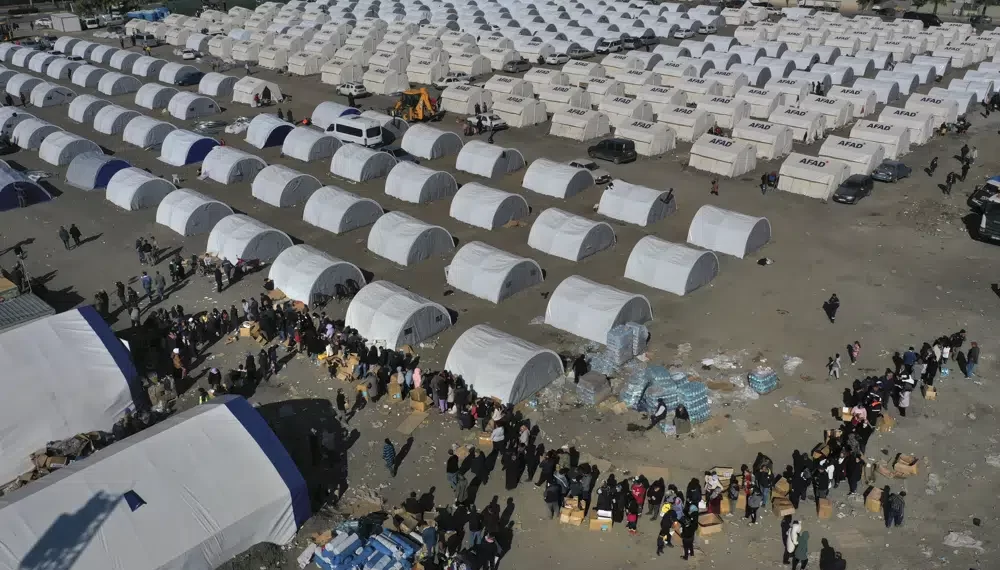Nearly two weeks after the devastating earthquakes that rocked Turkey and Syria, many are still struggling to fulfill their basic needs and some are sleeping in tents, factories, train cars and greenhouses.
People displaced from their homes in the disaster zone described a wide range of conditions: the fortunate ones were able to find regular hot showers, while others feared freezing to death.
The Turkish government and dozens of aid groups have launched a massive relief effort. The government announced on Wednesday, February 15, 2023, that more than 5,400 shipping containers have been deployed as shelters and over 200,000 tents dispatched.
The government says at least 84,000 buildings, containing more than 332,000 dwellings, were either destroyed by the February 6 quake or too damaged to be used.
There is no official figure for the number of people displaced in Turkey’s side of the disaster region, which is home to some 14 million, or 16% of the country’s population.
In the mountain villages of Kahramanmaras province, locals battle to keep warm during the bitterly cold nights.
Buyuknacar, a village just a few kilometers (miles) from the epicenter of the 7.8 magnitude quake, was severely damaged and 158 were killed. Two days after the initial tremor, a military helicopter brought supplies and on the fifth day, the road was cleared.
Although the villagers have tents, they are too weak to keep out the cold. Villagers said they feared icy conditions in the mountains would lead to further deaths.
Umut Sitil, 45, said, “Our basic need is, first, containers. Tents won’t work here. People in tents will freeze to death.”

On Tuesday, February 14, 2023, President Recep Tayyip Erdogan said that 2.2 million people had left the disaster zone. Of those, he said, the housing needs of 1.6 million had been fulfilled, including some 890,000 people placed in public facilities, such as student dormitories, and 50,000 in hotels.
The Transport Ministry has disclosed that the government had helped more than 272,000 to evacuate by air, sea and rail.
However, many people prefer to remain close to their homes, either to protect their possessions, wait for relatives’ bodies to be recovered or, in rural areas, care for their livestock.
Others seeking protection from winter temperatures have resorted to any structure that will keep out the elements.
Near the Mediterranean coast in Hatay, one of the hardest-hit provinces, farmers in Samandag district fled their damaged homes to large greenhouses normally used for growing tomatoes, bringing with them whatever bedding and cooking utensils they could salvage.
Locals said that around 2,000 people were now living under the plastic covers. Many had lost not just their homes but also their livestock.
UN Appeals For $1 Billion To Help Turkey Quake Survivors

The United Nations has launched a $1 billion appeal to help 5.2 million survivors of the most devastating earthquake in Turkey’s modern history, two days after starting a $397 million appeal to help nearly 5 million Syrians across the border in the rebel-held northwest.
U.N. Spokesman, Stephane Dujarric was bombarded with questions about why the appeal for Turkey is targeted at only 5.2 million people when according to the U.N. and the government more than 15 million people were affected.
Also, Dujarric was asked why the appeal for Turkey is two and a half times larger than the one for Syria to help almost the same number of people.
Dujarric replied that the Turkish appeal “was designed in very close cooperation with the government of Turkey, which is leading the relief efforts.”
“This is the number they came up with for the focus on people who need the most humanitarian aid, most quickly, and where the U.N. can be most effective,” Dujarric said. He said Turkey has “a very efficient search and rescue and humanitarian system.”
As for the disparity in the amount of the appeals, Dujarric remarked, part of the reason is that “there is already a well-established humanitarian community which has been working in Syria,” and before the quake there was a $4.8 billion humanitarian appeal for Syria for 2023.
Both appeals are for emergency funds for the next three months, and will be followed by fresh appeals for longer-term help.
READ ALSO: At Munich Security Conference, Zelenskyy Urges Allies To Quicken Military Support




















